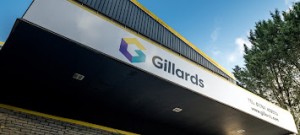Bristol-based e-fulfillment and logistics provider Gillards has outlined ambitious growth plans with a rebrand and the appointment of three non-executive directors.
The owner-managed firm described the moves as creating a solid foundation to grow its turnover by 15% and increase its headcount from 20 to 35 ahead of its 45th year in business in 2026. 
Owned by Daniel Gillard, whose father started the business in 1981, Gillards operates from a 110,000 sq ft warehouse in Temple Cloud, counting Children’s Hospice South West, English Heritage and promotional products firm Yarto among its clients.
Daniel, pictured, who took the reins six years ago, has formed the new, multi-skilled board to help him achieve his objectives for the business in the post-Covid market.
Alongside these appointments, Gillards has also been accredited to the Good Business Charter, which recognises responsible business practices.
Daniel will work closely alongside the board and managing director Andrew Clarke to spearhead the firm’s growth plans.
Newly appointed non-executive director Chris Hurdle has previously been a customer and a supplier to the business and brings comprehensive retail expertise to the role.
Richard Gore, a partner in the Bristol office of national law firm Shakespeare Martineau, has also been appointed to Gillard’s board, bringing with him more than 25 years’ experience in commercial law.
The third of the new non-executive appointments is marketing and brand specialist Jo Stevens.
Jo previously worked as a marketing and business development manager at Shakespeare Martineau and is also a director of Hive, which was responsible for Gillards rebrand.
Gillards said she added marketing strategy, brand building and digital transformation know-how to the board’s skillset.
Daniel Gillard said the firm’s recognition by the Good Business Charter and the three non-executive director appointments marked the start of “a really exciting chapter of growth”.
He added: “With the business in good shape post-Covid and our 45th anniversary fast approaching, now felt like the right time to put a stake in the ground and really ramp up our plans.
“While we’re really excited by the business’s potential, this growth certainly won’t come at the cost of being a responsible, sustainable business.
“The Good Business Charter gives us a good framework to benchmark our business against and we’re investing more in our sustainability efforts too as part of our plans.
“The rebrand is also an important part of this, allowing us to convey our values and purpose more accurately and giving our customers the best possible experience of working with us.”
To qualify for Good Business Charter accreditation, businesses must operate against a set of 10 commitments, including providing a real living wage and fair hours for employees, as well as promoting equality, diversity and inclusion.
Accreditation also requires businesses to operate ethical sourcing policies and to demonstrate environmental responsibility.
Paying suppliers on time and paying fair taxes is also included in the charter.





























